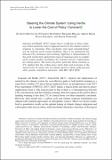Steering the Climate System: Using Inertia to Lower the Cost of Policy: Comment
Author(s)
Mattauch, Linus; Matthews, H. Damon; Millar, Richard; Rezai, Armon; Solomon, Susan; Venmans, Frank; ... Show more Show less
DownloadPublished version (1.109Mb)
Publisher Policy
Publisher Policy
Article is made available in accordance with the publisher's policy and may be subject to US copyright law. Please refer to the publisher's site for terms of use.
Terms of use
Metadata
Show full item recordAbstract
Lemoine and Rudik (2017) argues that it is efficient to delay reducing carbon emissions, due to supposed inertia in the climate system's response to emissions. This conclusion rests upon misunderstanding the relevant earth system modeling: there is no substantial lag between CO2 emissions and warming. Applying a representation of the earth system that captures the range of responses seen in complex earth system models invalidates the original article's implications for climate policy. The least-cost policy path that limits warming to 2°C implies that the carbon price starts high and increases at the interest rate. It cannot rely on climate inertia to delay reducing and allow greater cumulative emissions.
Date issued
2020-04Department
Massachusetts Institute of Technology. Department of ChemistryJournal
American Economic Review
Publisher
American Economic Association
Citation
Mattauch, Linus, et al. "Steering the Climate System: Using Inertia to Lower the Cost of Policy: Comment." American Economic Review, 110, 4 (April 2020): 1231-37.
Version: Final published version
ISSN
0002-8282